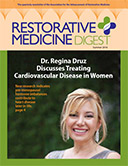Jen Palmer, ND, Education Director for the Restorative Medicine Herbal Certification program, interviewed Mary Bove, ND, faculty member. Here are some insights on Dr. Bove’s background and what you will learn in the program.
JP (Jen Palmer): Hi Dr. Bove, thank you for being with us today! Could you start by telling us about your background and experience in herbal medicine?
MB (Mary Bove): I'm a naturopathic physician and a medical herbalist, and I came to my profession through my love of plants and herbal medicine. I pursued a degree in phytotherapy/ herbal medicine back in the 1980s in England, and became a member of the National Institute of Medical Herbalists in Great Britain. I then attended Bastyr University, and got my naturopathic and midwifery degree.
After I got my degrees, I practiced in Seattle, and in 1993 I bought a practice in Vermont.
I left my practice in 2014, after 25 years of practicing primary care and doing home births in the community. And at that point I focused on education, formulation, and research and development for Gaia Herbs for five years.
JP: You really had a diverse experience being a clinician and an educator - it’s a big accomplishment.
MB: It really was. And in looking back I realize how much I learned. I got a tremendous amount of experience and it was one of the ways that I quickly understood, "These things [herbs] I can depend on in my treatment protocols, but these things are not necessarily as dependable." I also was able to weed out some of the academic information that we learned that isn't as practical and useful in the clinical situation.
JP: That's what makes you such a perfect candidate to be a faculty member in the herb program, because you have a very diverse clinical background, and you understand the real-life applications of the herbs, not just from the perspective of an herbal expert. You can help clinicians get to the end point without needing a lot of time to experiment, like you had to.
MB: Absolutely. I think that for clinicians who come from mainstream medical school or chiropractic school, to understand the herbal nuances, they have to step back from the way they look at medicine, and look at it through the herbal eyes.
JP: Did you also find that there can be a contrast between reading the research, versus using the herb in a clinical setting?
MB: I think that often science comes from a very reductive place, so it looks at the chemicals, the actions, and the responses that it would have with its environment. But in the plant, there is a synergy of compounds which influence bioavailability and actions.
On the other hand, science can help us confirm things that we've known in traditional herbalism, but didn’t completely understand. For instance- with lemon balm, science showed us that more isn't necessarily better, which helped refine dosing recommendations.
JP: Do you have a favorite herb?
MB: Over the years I've had multiple favorite herbs, – my old standbys are what I call my three Rs: Rosemary, Rose, and Rhodiola. But the other two would be lemon balm, and recently, in the last two years, I've really taken an interest in spearmint. That has to do with the recognition that it is not only a nice tasting confectionary herb, but also an effective nootropic, and that it's very high in rosmarinic acid. Both peppermint and spearmint are being looked at as nootropics for the short term; for example, after drinking the tea form, within 45 minutes you start to see an improvement in coordination, cognition, and driving ability.
JP: Thank you for that helpful clinical pearl! Let’s wrap up by talking about what you're covering in the Restorative Medicine Herbal Certification Program in Miami this May.
MB: I am so excited to be a part of this. I'll be covering the gastroenterology module; we'll be looking at the digestive system, one of the foundational pillars of health. Students will gain an understanding about some of the traditional uses of plants, such as carminatives and bitters for the GI tract, and the dynamics of upper GI tract issues such as dyspepsia and helicobacter. Then we'll look at the liver herbs, and how that affects liver function within the GI tract. That will bring us to discussion about detox, and some of the other functions that are needed for GI health.
Then we'll be looking at using herbs that affect mucosal immunity, that affect epithelial tissue in the gut, and that influence our microbiome, and the microbiome's influence and connection to irritable bowel syndromes, inflammatory bowel diseases, leaky gut, and dysbiosis. There's a lot to cover!
JP: Fortunately, we were able to offer your GI presentations at the beginning of the program, to give people a really good foundation to build from. We're excited that attendees will be able to learn in an intimate setting and ask you for suggestions in the roundtable discussions.
MB: I am delighted, and I really look forward to being able to not only share my clinical pearls, but be able to share ideas with everyone in the group.
